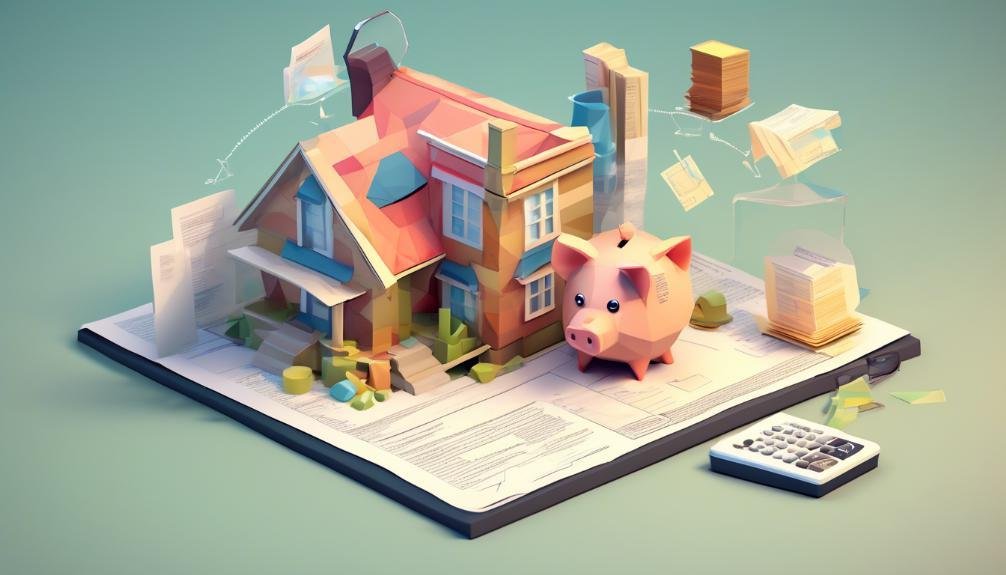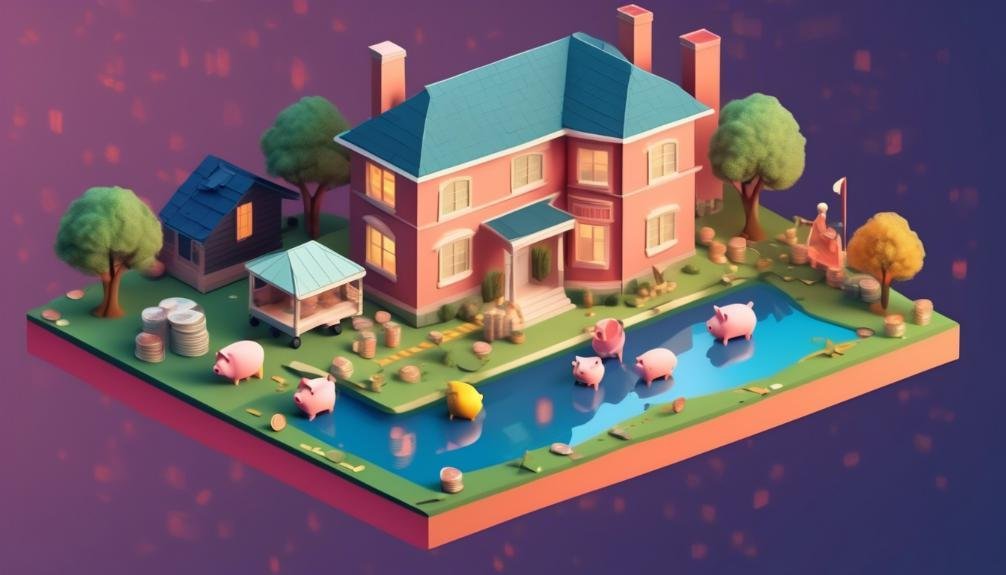You may have heard that picking a mortgage is easy, but that's not quite true. Let's simplify this complex process of choosing a home loan. When you compare fixed-rate mortgages, which have the same interest rate for the entire loan term, to adjustable-rate mortgages, which can change over time, think about how these options might affect your monthly payments and overall budget. Government-backed loans like FHA or VA loans offer certain protections, but you need to figure out if they're right for you based on your unique financial situation. Then there are conventional loans, which are not insured by the government, and may have varying terms and conditions that you'll need to carefully evaluate.
As you stand at this crucial financial decision point, the mortgage you pick will have a big impact on your finances for many years. So, take a moment to focus, and let's make sense of the different types of mortgages you can choose from. With a clearer understanding, you can make a choice that's best for your financial future. For example, if you're planning to stay in your home for a long time, a fixed-rate mortgage might be more suitable since it offers stability with your monthly payments. If you're looking for lower initial payments and are comfortable with the risk that rates might increase, an adjustable-rate mortgage might be the way to go.
Remember to look at the details, like the interest rate, loan term, and any potential penalties for early repayment. A conversation with a financial advisor or a mortgage broker can also help you get a better understanding of what's available and which option is the most beneficial for you.
Understanding Mortgage Basics

Before we look at different mortgage options in Chambersburg, Shippensburg, Waynesboro, and Greencastle, let's make sure we understand what a mortgage is. Put simply, a mortgage is a loan from a financial institution that helps you purchase a house. The house you buy serves as security for the loan, meaning if you fail to make your payments, the lender can take ownership of the home.
It's important to know how you'll pay back the loan. This includes the principal, which is the original amount you borrowed, and the interest, which is the fee for using the lender's money. You'll repay the loan in monthly payments, part of which reduces the principal and part of which covers the interest.
The length of your mortgage, known as the term, will determine your monthly payments and the total interest you'll pay. Shorter terms usually mean you'll make larger monthly payments, but you'll pay less interest over time. When choosing a mortgage, you'll come across fixed-rate mortgages, which have the same interest rate for the entire term, and adjustable-rate mortgages, which have interest rates that can change. The best choice depends on your financial situation and what you plan for the future.
For instance, if you're planning to live in your home in Greencastle for a long time, a fixed-rate mortgage might be a good fit because it offers stability with consistent payments. On the other hand, if you're in Shippensburg and you expect your income to increase or plan to move in a few years, an adjustable-rate mortgage could be more suitable since it often starts with a lower interest rate.
Evaluating Fixed Vs. Adjustable Rates
When you're looking at mortgage choices, it's important to know the difference between fixed-rate and adjustable-rate mortgages. Fixed-rate mortgages keep the same interest rate throughout the loan, which means your monthly payments won't change. This is great if you like to know exactly what you'll be paying each month, especially when rates are low, because you won't have to worry about them going up. But if rates go down, you won't automatically get the lower rate—you'd have to refinance, which costs money.
On the other hand, adjustable-rate mortgages (ARMs) start with a lower rate that can change based on a financial index. This may lead to lower payments at first, but there's a chance your payments could go up if the rates increase. ARMs might work for you if you expect to make more money in the future, if you plan to sell your home before the rate changes, or if you're okay with your payments going up and down.
Choosing between a fixed-rate and an adjustable-rate mortgage depends on how steady your finances are, what you plan to do with your home, and how you feel about the chance of interest rates changing. Think carefully about these things to pick the mortgage that fits your situation best.
Assessing Government-Backed Mortgages

If you're looking to buy a home for the first time or don't have much money saved for a down payment, government-backed mortgages are a solid option. These loans help make it less risky for banks to lend to you, which can mean you pay less initially and it might be easier for you to get approved.
For example, with FHA loans from the Federal Housing Administration, even if your credit score isn't that high, you can still potentially qualify for a loan with only a 3.5% down payment. But remember, you'll have to pay for mortgage insurance every month because it protects the bank if you can't pay your loan. This extra cost is important to think about when budgeting for your new home.
VA loans, on the other hand, are only for people who have been in the military, veterans, and their surviving spouses. These loans are great because you don't need to put any money down at all, and you don't have to pay for mortgage insurance, which saves you a lot of money over time.
When looking at these loans, it's important to consider both the upsides and any extra costs. While government-backed mortgages can make it easier to get into a home, you want to be sure the loan's terms aren't going to be a problem for you down the road. Make sure the loan you choose fits your budget and future financial plans.
Comparing Lender Types and Services
When you're looking for a mortgage, it's important to look at different lenders to find the best option for you. Traditional banks are reliable and have a lot of services, including mortgages. They are convenient because you can do all your banking in one place, but sometimes their mortgage rates and fees are higher.
Credit unions are owned by their members and often have lower rates. To join, you need to meet certain criteria, like where you work or live. They're good for more personal service but have membership rules.
Online lenders are popular because they're easy to use and often have good rates. They're great if you're okay with doing things online without much direct contact with loan officers. However, you might miss out on the personal touch you would get from a physical bank.
Mortgage brokers do the legwork for you in finding low rates. They work with various lenders, including those with unique loans for expensive homes. Keep in mind that brokers charge a fee, which adds to your total mortgage cost.
In short, when picking a lender for your mortgage, consider what's important to you: Are lower rates and personalized service worth a membership at a credit union? Do you prefer the convenience of online management, or do you value face-to-face interactions at a bank? Don't forget to factor in the potential fees when using a mortgage broker.
Analyzing Loan Terms and Conditions

It's important to really understand the details of a loan when you're looking for a mortgage that fits your budget and goals. Keep a close eye on the interest rate because it decides how much you'll pay each month and in total over the whole period of the loan. A fixed rate means your payments stay the same, which is great for planning your finances. An adjustable rate might change, which could mess with your budget.
You should also think about how long you'll be paying back the loan. It can be anywhere from 10 to 30 years. A shorter loan period means you pay more each month, but you save on interest in the long run. A longer loan stretches out your payments, making them smaller each month, but you'll end up paying more interest over time. It's also smart to look at the amortization schedule to see how much of your payments go toward the interest and the principal part of the loan.
Be sure not to miss any extra costs like origination fees, the expenses you pay when you close on your house, and any fees for paying off your loan early. These can really add to your total costs, so knowing about them helps you pick the best lender.
Finally, think about how flexible the mortgage is. Some loans let you change terms or take breaks from payments if you run into money troubles. When you look at all these parts of the loan carefully, you can make a choice that's good for your finances in the long run.
Let's say, for example, you're comparing two different 15-year mortgages. Mortgage A has a 3% fixed interest rate with a $1,000 origination fee and no prepayment penalty. Mortgage B has a 2.75% adjustable rate, with a $2,000 origination fee and a prepayment penalty of 2% of the loan's balance. Even though Mortgage B has a lower initial rate, Mortgage A might be the better deal because the rate won't change over time, and it has lower fees. Plus, if you come into some extra cash and can pay off the mortgage early, you won't be penalized like you would with Mortgage B.
Conclusion
Navigating through the various mortgage options can be complex, but with careful research and determination, you're now equipped to make an informed decision on your home loan. It's important to consider the type of loan that best suits your financial situation. For example, a government-backed loan might offer more security and benefits like lower down payments, which is helpful if you're looking for stability and perhaps have less savings upfront. On the other hand, a conventional loan from a private lender might be more suitable if you have a strong credit history and can afford a larger down payment, possibly leading to better interest rates and lower insurance costs.
When deciding, it's crucial to understand that your choice will significantly impact your finances for years to come. Opting for a fixed-rate mortgage means your interest rate stays the same throughout the life of the loan, which makes financial planning easier since you'll know exactly what your payments will be. However, an adjustable-rate mortgage could initially offer a lower interest rate, which then fluctuates with market conditions. This could be beneficial if you plan to sell or refinance before the rate changes significantly.
Ultimately, your decision should be based on a careful evaluation of your long-term financial goals, current financial health, and the housing market. Consider consulting with a financial advisor or a mortgage professional to help guide you through the process and provide personalized recommendations. Remember, selecting the right mortgage is a critical step in homeownership, so take the time to choose a loan that aligns with your needs and goals.

